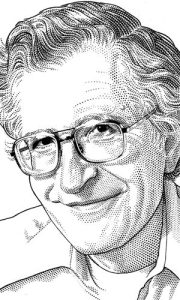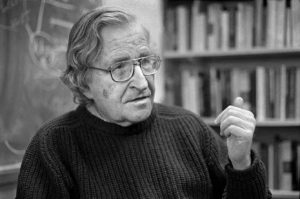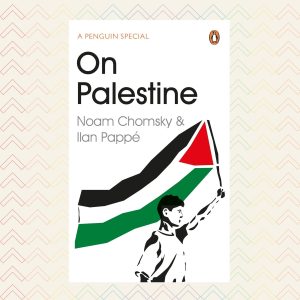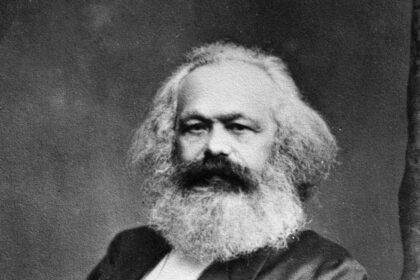“If you want to conquer a people, create an imaginary enemy who seems more dangerous than you, then be their savior.”
— Noam Chomsky
The first time I was introduced to Noam Chomsky was in my university. My department of Media and Communication Studies displayed a huge banner consisting of his brief introduction and picture alongside other renowned figures in journalism and political commentary to honor them during an international conference organized by the department—although his intellectual depth and wisdom are incomparable. Like the majority of people, in this country at least, I, too, was unaware of Chomsky’s magnificent persona and the amount of work accredited to him. However, after a few months, thanks to my professor, I was given a task to write about Chomsky’s work on political economy. That was the point I started to get enlightened about one of history’s most honest, courageous, and prolific writers to ever be born.
A Brief Introduction of the Living Legend and an Overview of His Work

Avram Noam Chomsky was born in 1928, and at 96 years of age, he has lived on to witness history-altering events in the world. He is gifted with an immense forte for writing and has proved to be a jack of all trades. Not only did he serve as one of the best linguists in modern history, but he was also bestowed with the title of “Father of Modern Linguistics” due to his groundbreaking work in the field. He revolutionized linguistics with his introduction of the Chomsky hierarchy, concepts of universal grammar, and generative grammar. Chomsky is also one of the founders of cognitive science.
Other than linguistics, he proved to be adept at political analysis and social criticism, with most of his writings focusing on the United States’ role in the political developments all over the world, including wars and conflicts, as well as the role of the ruling elite in controlling ordinary citizens. He bluntly wrote about the media’s propagandist nature, capitalist-driven corporations shaping public opinion for their profits, and the facade of democracy in the so-called “greatest country in the world,” the United States of America. He backed every piece of writing with a bulk of well-researched and well-read evidence from multiple sources.
With dozens of books, including Failed States, How the World Works, and Media Control, as well as numerous research papers—on the themes of politics, geopolitics, linguistics, and media—to his name, Noam Chomsky is one of the best intellectual figures of the twentieth and twenty-first century.

Manufacturing Consent
I was in my fourth semester of BS Media and Communication Studies when we were assigned to read excerpts on propaganda from this book called Manufacturing Consent: The Political Economy of Mass Media, co-authored by Noam Chomsky and Edward S. Herman. That was the time I got to learn about the five filters through which every piece of information is passed to extract a new narrative suited to the ruling elite. In simple words, Chomsky described how public consent is “manufactured,” which is intended to serve the interests of the minority of conglomerates who own and control the majority of resources and people in the U.S. For a beginner, who is not related to media studies, this book serves as the best source to understand the dynamics of mass media, along with the existence and functioning of gigantic corporations who own various businesses, including those of military-industrial complexes, and use their media networks to protect propagandist agendas.

On Palestine
Noam Chomsky has been a vocal critic and opposer of the Zionist ideology. He has displayed his anti-Zionist views through his books, interviews, and speeches where he has stood as a staunch supporter for an independent Palestinian state and the illegitimacy of the creation of the Zionist state of Israel. During the present Israel’s constant war against Palestine, post-October 7, 2023, Chomsky has shared his views on various forums, even at this age. A book titled On Palestine comprises interviews, lectures, and talks by Noam Chomsky and Ilan Pappe, who is another eminent professor. This book provides a detailed and in-depth overview of the historical roots of the Israel-Palestine conflict, its developments through the decades, and the future of the region. This book describes an objective and honest look into the matter for the readers.

To Sum It Up
My connection with Chomsky’s works has grown stronger over the past five years as I have tried to study his ideas and views on various topics and themes. Obviously, I have just begun my journey of exploring his intellectual realm. He is truly an inspiring figure for me, not just because he is a great writer, but also due to his vociferous and valiant way of speaking his mind and heart out, with authentic references, of course. The world will certainly not have another Noam Chomsky anytime soon, and we must celebrate this living legend of our time by giving further recognition to his works. I would conclude this piece with a tribute statement for Noam Chomsky by one of the most celebrated Indian authors, Arundhati Roy, who has said,
“When the sun sets on the American empire, as it will, as it must, Noam Chomsky’s work will survive.”
















Your writing is truly breathtaking! The way you weave words together is not only informative but also incredibly inspiring.